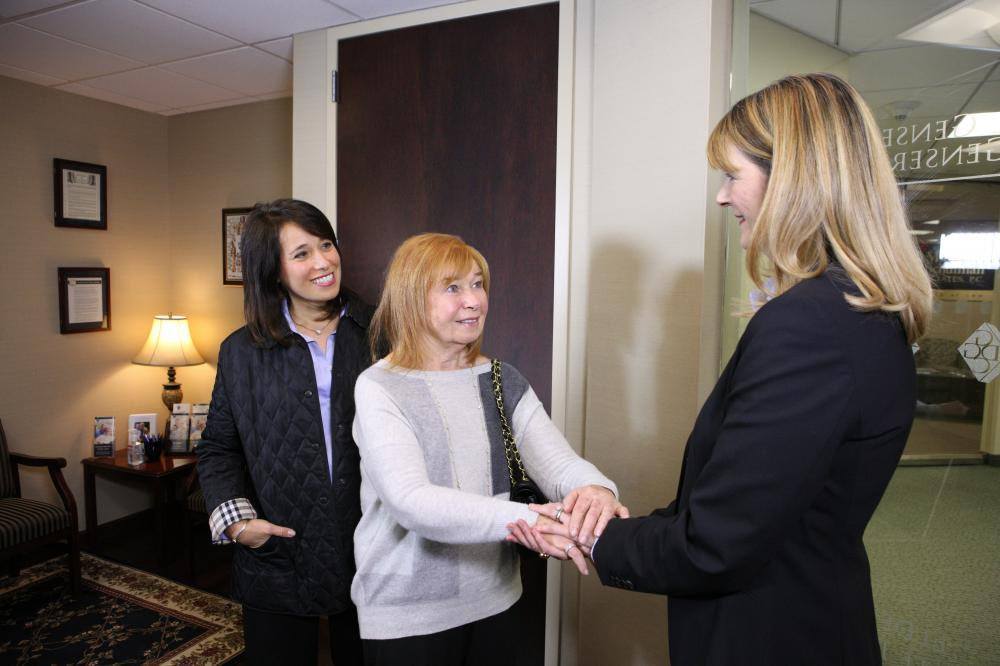HEALTH CARE FACILITY: GUARDIANSHIPS
New York HEALTH CARE FACILITY GUARDIANSHIPS

A resident's incapacity must not prevent your facility from recovering money owed for services rendered or expose you to liability when health care decisions need to be made. Cona Elder Law will petition the Court to appoint a guardian who will marshal the resident's assets to ensure payment to the facility and/or who can make crucial health care decisions.
Through the guardianship process, we will secure financial assets to guarantee outstanding debts of the resident by restraining bank accounts, attaching real property and requiring asset spend downs to secure Medicaid eligibility.
We can further protect you from dangerous and unnecessary exposure by effectively and properly handling emergency petitions and life support hearings, and help you achieve timely discharges and transfers.
What is New York’s Mental Hygiene Law?
Pursuant to Article 81 of the Mental Hygiene Law (MHL), the court is required to find that the guardianship appointment is necessary to provide for the personal needs and property management of the resident, the Alleged Incapacitated Person (AIP). In addition, the AIP must either:
-Consent to the appointment of a guardian, or
-Be incapacitated
In order to determine whether the AIP can be deemed “incapacitated”, the individual’s functional level and functional limits are considered, including:
-The individual’s actual needs
-Their ability to perform daily living activities
-The individual’s mental disabilities
-The individual’s physical illnesses

Why Use Cona Elder Law to Petition for Guardianship for Incapacitated Residents?
In many instances, nursing home residents are unable to act on their own behalf, have unwilling or uncooperative family members or do not have an agent with authority to act on their behalf appointed under a Power of Attorney.
To make matters worse, many residents also lack the support to tackle the arduous task of applying for Medicaid benefits. As a result, these residents may be subject to discharge from the healthcare facility for failure to pay or even civil litigation for the collection of the balance due. This results in a lose-lose situation for the resident and the facility:
-The disabled or elderly person who needs nursing home care fails to receive it
-The healthcare facility provides services and care for which they’re not paid
Medicaid Benefits and Guardianship Proceedings in New york
Instead of being faced with a moral dilemma, the Mental Hygiene Law allows facilities to file for guardianship for their residents who are incapacitated. Cona Elder Law successfully helps healthcare facilities secure government benefits and medical insurance on behalf of their residents.
Our experienced team of Guardianship attorneys in New York will work closely with your facility to guide you through the process of petitioning the court for guardianship. In the end, we’ll use our expertise to help you do what’s right for your resident and what's best for your facility.
What Alternatives Do Facilities Have to Guardianships?
File a Civil Suit
In the event it’s inappropriate to have a guardian appointed to help a resident, the option of bringing a civil suit to collect the balance does exist. While the civil suit may take care of the previous balance, it does nothing to address the costs of those who continue to stay in the facility. A civil suit also does not address health care needs or housing issues, such as when a resident can be discharged to an alternate level of care. In addition, a civil suit does nothing to address the resident’s need to secure Medicaid benefits.
If the resident lacks decision-making ability, a Guardian ad Litem (“GAL”) will be appointed for the resident in the civil litigation. However, a GAL is generally not empowered to consent to a proposed settlement, and the GAL’s role is limited to protecting the defendant’s rights in that litigation only.
Involuntarily Discharge the Resident
The only remaining alternative is to involuntarily discharge the resident, which is an option when they have failed to pay following appropriate and reasonable notice.
However, the resident will need around-the-clock institutional level care, so where will they go?
It’s likely no other facility will accept a resident without a payment source or insurance.
This presents a significant dilemma, which can usually be circumvented with the use of a guardianship.
Contact Us for New York Healthcare Facility Guardianships
To protect your health care facility’s bottom line and your residents, contact the experienced attorneys at Cona Elder Law. The attorneys at Cona Elder Law offer decades of experience effectively preparing guardianship petitions and representing health care facilities in guardianship proceedings across New York State.
Contact us at 631-619-2533 to schedule a consultation with one of our experienced lawyers.
GUARDIANSHIPS
New York GUARDIANSHIP attorneys

In New York State, as in most states, the law presumes that an adult eighteen years of age or older is capable of handling his or her own affairs. When a person can no longer make safe decisions regarding their personal affairs or property or has become susceptible to undue influence or fraud, a guardian may be appointed by the Court to manage their affairs and make necessary decisions.
At Cona Elder Law, we understand the tremendous emotional burden families endure when faced with the prospect of an incapacitated loved one. Our Long Island elder law attorneys will help you navigate the complex legal procedure to have a guardian appointed so that you may properly care for your loved one.
What is a Guardianship?
A Guardianship is a powerful legal tool designed to help families protect a loved one who has become incapacitated. If a loved one cannot make financial or health care decisions for themselves and has failed to appoint a person to handle such matters on their behalf by executing a Power of Attorney or Health Care Proxy, they may require the appointment of a Guardian.

What is New York’s Mental Hygiene Law?
Pursuant to Article 81 of the Mental Hygiene Law, the Court must find that the guardianship is necessary to provide for the personal needs and property management of an incapacitated person. The individual’s functional level and functional limits are considered, including:
-The individual’s actual needs
-Their ability to perform the activities of daily living
-The individual’s mental abilities
-The individual’s physical illnesses
WHO CAN BE A GUARDIAN?
The Court will determine the best person to be the Guardian. The same person can be Guardian for both Personal Needs and Property Management or separate Guardians can be appointed. Co-Guardians can also be appointed. If there are no family members or loved ones willing and able to serve as Guardian, the Court can appoint an “independent Guardian” from a Court approved list. The individuals or agencies on this list have been pre-qualified and background checked. Every situation is different and the Court’s job is to hear all sides and reach the right result for your loved one.
WHAT POWERS WILL A GUARDIAN HAVE?
A Guardian may be appointed to serve as a substitute decision maker if a person is incapacitated due to certain functional limitations that affect their ability to tend to their personal needs or make prudent decisions with respect to their property management.
When a Court determines that a person requires a Guardian, the Court will tailor the Guardian’s powers to meet the needs of the incapacitated person while not being overly restrictive. Personal needs powers include decisions regarding medical care, medical treatments, hiring care providers such as home health aides or other services, and decisions regarding where the incapacitated person should live, including placement in a nursing home.
A Guardian of the Property may be granted authority to marshal an incapacitated person’s assets, pay their bills, create Trusts, sell real estate and handle retirement assets.
The Guardian can also engage in asset transfers and Medicaid planning with the Court’s approval. Effective Medicaid planning can protect the incapacitated person’s assets by making him or her eligible for government benefits.
What are Contested Guardianships?
In some cases, a Guardianship proceeding becomes contested and litigation may ensue, often because loved ones disagree about the care and needs of their aging family member, assets may have allegedly been misused or misappropriated, or the aging person themselves disputes the need for the appointment of a Guardian.
Contested Guardianships are often hard-fought, emotionally trying, time consuming and costly. A guardianship is a complex court proceeding but when it is contested, the Court adheres to a strict interpretation of the rules of evidence. This means that when you are involved in a contested Guardianship proceeding, you don’t need just an Elder Law attorney, you need an experienced Elder Law litigator who can be your zealous advocate in an adversarial courtroom such as the experienced attorneys at Cona Elder Law. At any given time, we are litigating over 1,000 active civil lawsuits, many of which are contested guardianship proceedings.
When is a Guardianship Proceeding Contested in New York?
A Guardianship proceeding in New York is contested when:
1. The individual disputes that they need a Guardian:
By way of example, the individual can have a diagnosis of dementia but still be capable of executing a Health Care Proxy and Power of Attorney. However, even if the individual has the capacity to execute a Health Care Proxy and Power of Attorney but still requires additional support managing their healthcare and/or finances, if they either refuse to appoint a Health Care Proxy and/or Power of Attorney or if they wish to appoint a person who is clearly unsuitable to serve in such a role, the guardianship matter would be litigated.
2. The previously appointed Health Care agent is not adequately providing for personal needs and will not voluntarily resign
Even if the individual appointed a Health Care agent prior to their incapacity, if the agent is shirking their obligations but refuses to resign, a Guardianship proceeding must be brought to have them removed as health care agent and a Personal Needs Guardian appointed.
3. The previously appointed Power of Attorney is not responsibly managing assets or has stolen assets and will not voluntarily resign
Like the Health Care Proxy example above, even if the individual appointed a Power of Attorney agent prior to their incapacity, if the appointed financial agent is derelict in their duties or misusing or misappropriating the individual’s assets, a Guardianship proceeding must be brought to have them removed as the financial agent and a Property Management Guardian appointed. In many cases, the financial agent will fight the revocation of the Power of Attorney as they know they will likely be audited, forced to repay the misused or misappropriated funds or in severe circumstances, face criminal charges.
4. There is a disagreement as to who should be the Guardian
Even if it’s clear that the individual is incapacitated and requires the appointment of a Guardian, a dispute can arise as to who that Guardian should be. Under these circumstances the Court will look at the relationship between the person seeking Guardianship (the Petitioner) and the individual, the family circumstances and dynamics, the best interests of the incapacitated individual, and the suitability of the Petitioner to serve in a fiduciary capacity (ex. criminal record, recent history of bankruptcy filings, outstanding civil judgments, etc.).
Contact Cona Elder Law for Guardianships and Contested Guardianships in New York
At Cona Elder Law, our experienced Long Island Elder Law attorneys and seasoned litigators will help you navigate the complex court process to protect your loved one. We zealously advocate for our clients while compassionately guiding them through the guardianship process in all court jurisdictions throughout New York State and we’ll do the same for you. Contact us today to see how we can help.






